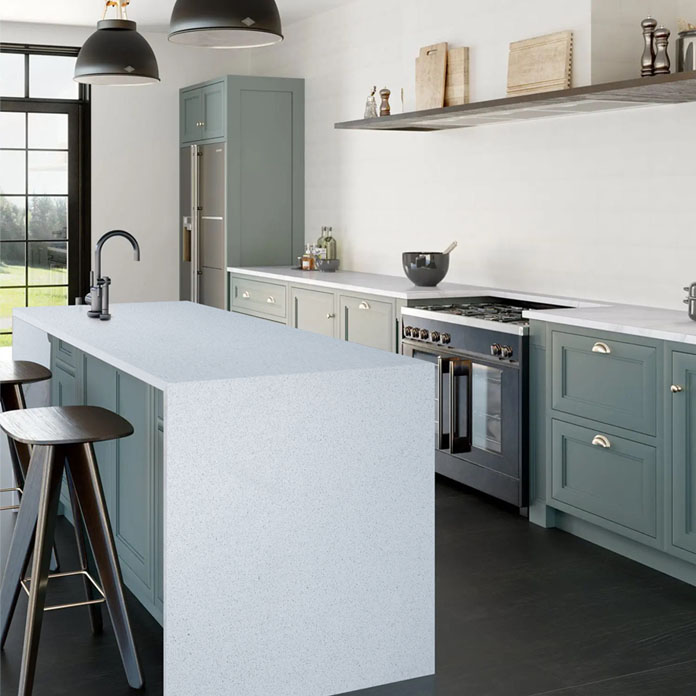- December 30, 2024
- 0
- Quartz
Quartz Slabs vs. Granite: Which is More Suitable for Your Kitchen?

When it comes to choosing a countertop for your kitchen, two of the most popular options are quartz and granite. Both materials offer durability, style, and practicality, but they have distinct differences that can make one more suitable for your specific needs. Let’s take a closer look at how quartz slabs and granite compare and which might be the better choice for your kitchen.
- Composition and Appearance
Granite is a natural stone that is quarried directly from the earth. Each slab of granite has unique patterns and color variations, giving your kitchen a one-of-a-kind appearance. Its natural beauty is a big draw for homeowners seeking a timeless, organic look.
Quartz, on the other hand, is an engineered stone made from crushed quartz crystals mixed with resins and pigments. This manufacturing process allows quartz countertops to come in a wide range of colors and patterns, many of which mimic the look of natural stone like marble or granite but with more uniformity.
Verdict: If you prefer a natural and unique look, granite might be more suitable. If you want more control over color consistency and design, quartz offers more options.
- Durability and Maintenance
Granite is known for its strength and durability, being highly resistant to heat and scratches. However, because granite is porous, it requires regular sealing to prevent stains and bacteria buildup. Neglecting to seal it properly can lead to long-term damage.
Quartz is non-porous, meaning it doesn’t need to be sealed, making it highly resistant to stains, bacteria, and scratches. It is also less prone to chips and cracks compared to granite. Quartz is ideal for a low-maintenance kitchen that still looks high-end.
Verdict: For durability and ease of maintenance, quartz takes the lead with its non-porous nature and stain resistance, while granite requires more upkeep.
- Heat Resistance
Granite can handle high temperatures, making it a good choice for those who frequently cook and place hot pots and pans directly on the countertop. It won’t suffer damage from occasional exposure to heat.
Quartz, though durable, is more sensitive to extreme heat. Placing hot pans directly on quartz countertops can cause discoloration or even cracking due to the resin used in its manufacturing.
Verdict: If heat resistance is a priority, granite is the more suitable option for your kitchen.
- Aesthetic Options
Because granite is a natural stone, its color palette is limited to what nature offers. While each slab is unique, you may have fewer options compared to engineered quartz.
Quartz offers a wider range of colors and patterns because it is man-made. You can find quartz countertops in virtually any color, including bold hues and subtle tones that are not typically available in natural stone.
Verdict: For a wider variety of design options and patterns, quartz is the better choice.
- Cost Considerations
Both granite and quartz are considered premium materials, but the price can vary depending on the quality and rarity of the stone. Generally, high-end granite can be more expensive than quartz, especially if you select a rare variety. However, quartz can also be pricey depending on the brand and design.
Verdict: Both materials are similarly priced, but granite can be more expensive for rare varieties. Quartz often provides more consistent pricing.
- Environmental Impact
Granite is a natural resource that must be mined from quarries, which can have environmental impacts depending on the location and extraction methods.
Quartz is engineered using natural quartz mixed with resins. While it requires less mining than granite, it does involve manufacturing processes that can have their own environmental effects. However, some quartz manufacturers offer eco-friendly options by using recycled materials.
Verdict: For those concerned about sustainability, some eco-friendly quartz options may be a better choice than granite.
Conclusion
When comparing quartz slabs and granite for your kitchen, both materials offer distinct benefits. Granite is perfect for those who value natural beauty, heat resistance, and a one-of-a-kind look, while quartz is ideal for homeowners seeking a low-maintenance, stain-resistant, and highly customizable countertop. Ultimately, the best choice depends on your kitchen’s specific needs, design preferences, and maintenance expectations.
